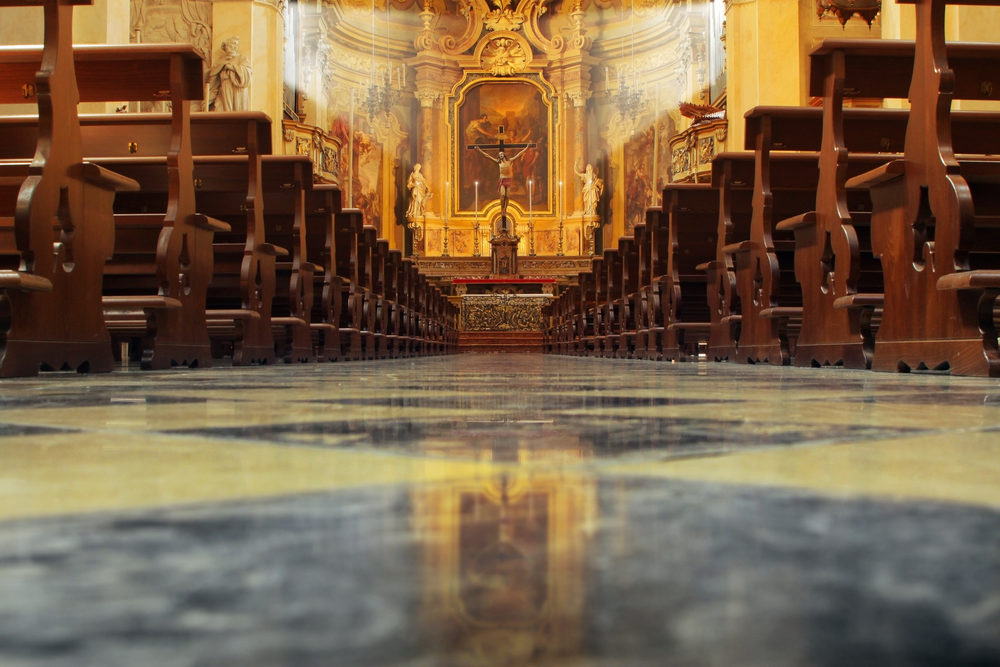
St. Augustine, FL – Shocking revelations emerged from recently obtained archive records exposing a pattern of alleged child abuse and impregnation by now-deceased Catholic priest William Malone in the Diocese of St. Augustine. The documents, provided by the Diocese to the Florida Attorney General’s Office of Statewide Prosecution, shed light on a series of disturbing incidents that occurred in the 1980s at Sacred Heart Church located at 5752 Blanding Blvd, Jacksonville, FL 32244.
Multiple Victims Come Forward Accusing Fr. Malone of Child Sexual Abuse
Since the early 1990s, at least four women have repeatedly approached the Diocese of St. Augustine with complaints about the sexual abuse they suffered at the hands of Fr. Malone. The victims, who were young girls at the time, allege that Malone molested and fondled them, with one of them becoming pregnant as a result of the abuse.
Diocese of St. Augustine Failed to Report Known Allegations of Sex Abuse Against Preist
The archive records indicate that the late Bishop John Snyder was aware of Fr. Malone’s misconduct as early as 1991. At that time, the parents of a young parishioner reported that their daughter had been repeatedly molested by Malone during confession when she was just 11 years old. However, the allegations were dismissed by the diocese as “conjecture” and “not credible” due to the victim’s reluctance to meet with diocese officials.
Despite the knowledge of Malone’s abusive behavior, the diocese did not report the allegations to the police. Instead, in 1991, Malone was transferred to another parish within the Diocese of St. Augustine, specifically St. Elizabeth Seton Catholic Church in Palm Coast, where he served as an associate pastor for a year.
Diocese Allegedly Covers Up Victim’s Pregnancy, Pays Child Support to Conceal Priest’s Misdeeds
In 1992, Bishop Snyder became aware that Fr. Malone had impregnated a young parishioner. Although Malone had already been transferred back to the Holy Ghost Order in Long Island, New York, the Diocese of St. Augustine continued to provide child support payments to the mother of Malone’s child. Records show that the payments began in December 1992, and over the years, the diocese provided a total of $5,529 to support the child. The payments were carried out until 2010.
Catholic Bishops Aware of Ongoing Sexual Abuse, Yet Failed to Take Action
The newly uncovered documents also reveal a disturbing lack of action and a culture of secrecy within the diocese. Letters exchanged between Bishop Snyder and Rev. Brian McLaughlin of the Holy Ghost Order in Dublin in 1993 demonstrate a tacit acknowledgment of Malone’s abusive behavior. McLaughlin stated that Malone did not recall the incidents but accepted that “something must have happened.” Despite this admission, the abuse allegation was not reported to the police at the time.
Investigation Reveals Years of Priest Sexual Abuse Ignored by Diocese
In 2003, one of Fr. Malone’s victims, who had been abused at the age of 11, wrote a letter detailing the abuse and the previous meeting her parents had with Bishop Snyder in 1991. The Diocese of St. Augustine hired a victim advocate coordinator and established a Diocesan Review Board to investigate sex abuse allegations. However, the board did not investigate the allegations against Fr. Malone in 2003, and the police were not contacted.
It was only in 2018 that the woman came forward for the third time to report Fr. Malone’s molestation when she was 11 years old. The Diocesan Review Board, after examining an independent investigator’s report, found the allegations to be credible. The diocese’s private investigator finally shared the allegations with law enforcement in February 2018, five months after the diocese had been informed for the third time.
More Survivors Report Allegations of Child Sex Abuse Against Fr. Malone
Following the disclosure of the credible allegations against Fr. Malone in March 2019, a flood of additional complaints was lodged against him. Three more women came forward, recounting incidents of sexual abuse by Malone at Sacred Heart. The victims reported instances of molestation, sexual assault, and inappropriate physical contact, all consistent with the earlier allegations.
Inadequate Response and Flawed Investigation: Diocese Falls Short in Addressing Sexual Abuse Allegations
The Diocese of St. Augustine informed its parishioners about the credible allegations against Fr. Malone in March 2019. The diocese subsequently appointed a victim advocate coordinator and established a Diocesan Review Board to investigate sexual abuse allegations. However, the records indicate that the board did not investigate the allegations made against Fr. Malone in 2003, and the police were not involved until 2018.
Diocese’s Lack of Transparency and Incomplete Records Expose Possible Liability
Despite repeated requests for an interview, the Diocese of St. Augustine declined to comment on Fr. Malone’s case and other related incidents detailed in the recently acquired archives. The diocese’s attorney and communications director provided a statement emphasizing that the records speak for themselves. However, it should be noted that the obtained records are incomplete, leaving some aspects of the investigation and response unclear.
Statewide Investigation Against Rampant Clergy Abuse in Florida
The Florida Office of Statewide Prosecution has launched an investigation into the allegations of child abuse and impregnation by Fr. William Malone in the Diocese of St. Augustine. The Attorney General’s Office is working closely with law enforcement agencies to gather evidence and determine if criminal charges can be filed against any individuals involved in covering up or enabling the abuse.
The investigation aims to bring justice to the victims and hold accountable those responsible for the alleged misconduct. Authorities are urging anyone with information related to this case or other instances of abuse within the Catholic Church to come forward and cooperate with the ongoing investigation.
This shocking revelation has once again highlighted the pervasive issue of child abuse within religious institutions and the need for transparency, accountability, and measures to protect vulnerable individuals from such heinous acts. The investigation will likely shed more light on the extent of the abuse and the actions taken by the diocese in response to the allegations.
Seeking Justice and Healing: Empowering Survivors of Catholic Church Sex Abuse
In the wake of the allegations surrounding now-deceased priest William Malone in the Diocese of St. Augustine, the pursuit of justice for victims of clergy abuse becomes a pressing concern. To shed light on the legal options available to victims and their families, church abuse lawyer Michael Haggard, Esq., based in Florida, engages in an insightful conversation with attorney Laurence Banville. Discover the significance of civil cases, the distinctions from criminal cases, and the potential outcomes in the fight for justice and compensation against liable parties. Gain valuable insights and guidance on navigating the legal process in the aftermath of clergy abuse.
Laurence Banville (LB): Thank you for joining us, Mr. Haggard.
Michael Haggard (MH): Thank you, Mr. Banville. It’s my pleasure to be here today.
LB: In light of the recent allegations against the late Catholic priest William Malone, many victims and their families may be wondering what legal options are available to them. Could you shed some light on what survivors can do if they were sexually abused by a Catholic priest?
MH: Absolutely. Victims of sexual abuse by Catholic priests have the option to pursue civil cases against the parties responsible for their abuse. These cases typically involve filing a lawsuit against the liable parties, which may include the diocese, the individual priest, and potentially other entities involved in enabling or covering up the abuse.
LB: That’s important information for victims and their families to know. Could you explain how civil cases differ from criminal cases in cases of clergy abuse?
MH: Certainly. In criminal cases, the focus is on punishing the offender for their actions and potentially seeking justice through the criminal justice system. On the other hand, civil cases in cases of clergy abuse are aimed at seeking compensation for the victims and holding all responsible parties accountable for their actions or negligence. Civil cases provide victims and their families with an opportunity to pursue financial compensation for the harm they have endured, including medical expenses, therapy costs, and emotional suffering.
LB: That’s a crucial distinction. What would you say to victims or their families who might be hesitant to pursue a civil case due to concerns about the legal process?
MH: It’s understandable for victims and their families to have concerns about the legal process, especially given the sensitive nature of these cases. However, it’s important for them to know that they are not alone. Experienced attorneys specializing in clergy abuse cases can provide guidance, support, and legal representation throughout the entire process. They can help navigate the complexities of the legal system, gather evidence, and advocate for the rights and interests of the victims.
LB: Thank you for emphasizing the importance of seeking legal assistance. In your experience, what are some of the potential outcomes of civil cases against liable parties in clergy abuse situations?
MH: The outcomes of civil cases can vary depending on the specific circumstances of each case. However, successful civil cases can result in financial compensation for the victims, which can help them on their path to healing and recovery. Additionally, these cases can help expose the truth, hold responsible parties accountable, and contribute to the prevention of future abuses within religious institutions.
LB: Many survivors may wonder about the statute of limitations for filing a clergy abuse lawsuit. Could you provide some clarity on this matter?
MH: Certainly. The statute of limitations varies depending on the jurisdiction and can be complex in cases of clergy abuse. In some states, there have been changes to the laws that extend or eliminate the statute of limitations for these specific cases. It’s crucial for survivors to consult with an experienced attorney who can assess their individual situation and determine the applicable statute of limitations. It’s worth noting that even if the traditional statute of limitations has expired, there may be legal avenues available, such as the discovery of new evidence or the identification of previously undisclosed perpetrators, which could potentially allow survivors to bring their claims forward. Therefore, I strongly encourage survivors to seek legal guidance as soon as possible to explore their options.
LB: Thank you, Mr. Haggard, for sharing your insights on this important topic. Your dedication to representing victims of clergy abuse is commendable.
MH: Thank you, Mr. Banville. It’s essential to raise awareness about the legal options available to victims and their families and to provide support during their pursuit of justice and healing.
LB: Absolutely. We hope that this information will empower those affected by clergy abuse to take the necessary steps toward justice and closure. Thank you all for joining us today.
Seeking Justice For Clergy Abuse Starts Here – Contact Us for a Free Consultation
If you or a loved one have been a victim of clergy abuse, we understand the pain and challenges you may be facing. Know that you are not alone in your pursuit of justice. Our experienced team of attorneys is here to offer guidance, support, and legal representation. Contact us today for a free consultation to discuss your case, understand your rights, and take the necessary steps towards seeking the justice and compensation you deserve. Remember, your voice matters, and together, we can work towards holding the responsible parties accountable for their actions.

Mr. Banville is a personal injury attorney who has experience in handling auto accidents, work injuries, medical malpractice, dog bites, slip and falls, and representing survivors and victims of sexual abuse. Mr. Banville is affiliated with law firms in Pennsylvania, New York, New Jersey, Delaware, D.C., and Maryland. Abuse Guardian













Comments for this article are closed.